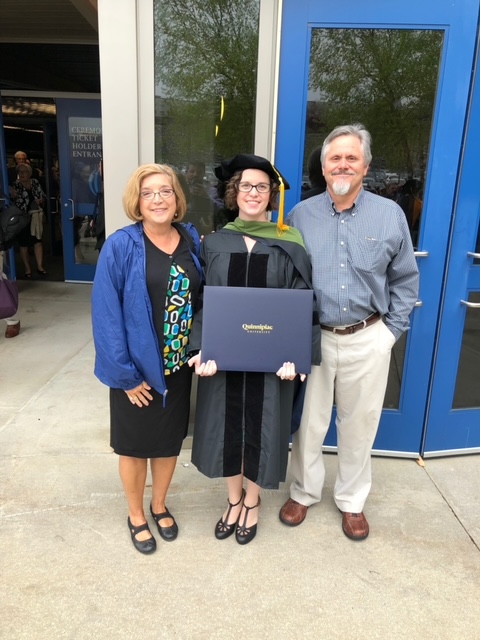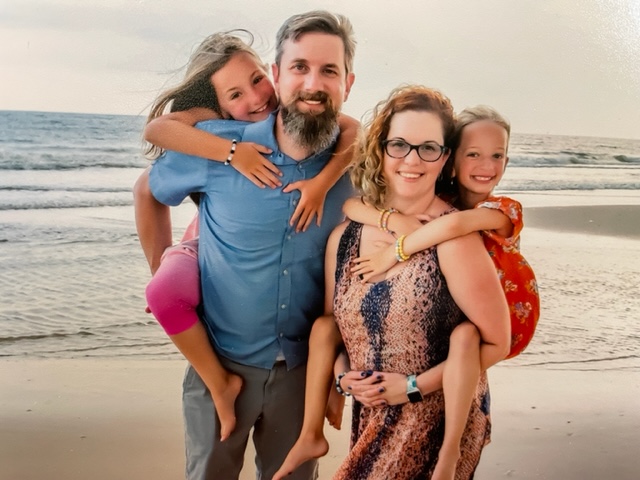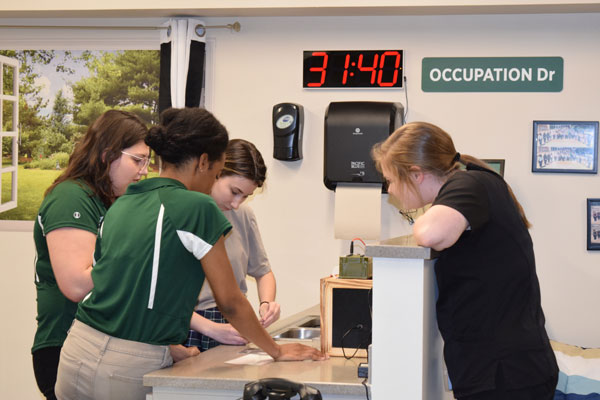
At the time, she was working as a pediatric feeding specialist at a clinic for children and adults with disabilities, where she also provided clinical instruction to OT students rotating though on fieldwork. It was a role she loved—and one that led her to pursue an advanced degree.
“One reason I went back to school was so I could step into the academic world, where I could teach on a bigger scale and make an impact on a bigger scale,” says Dr. Carpenter, who has now achieved those goals.
Since earning her OTD in 2018, she has played a pivotal role in the education of OT students, first as the academic fieldwork coordinator for Samford University’s Department of Occupational Therapy, and now as the inaugural doctoral capstone coordinator for UAB’s entry-level OTD program.
Capstone program emphasizes individuality
When Dr. Carpenter joined UAB’s OT department in 2020 to establish its capstone program, she focused on creating an environment in which students could design research projects that express their distinct passions and professional interests.
“Since day one, it has been about individuality for the students in their capstone projects, as well as collaboration with faculty and staff and our community partners,” she says. “My ultimate goal is to take students on a journey, from the creation of their project to its implementation, that maintains their creativity and fosters their writing skills so they can produce a quality but feasible capstone project in an area they are passionate about.”
Her number-one piece of advice for her students is to stay calm. “I remind them that this is a journey for all of us, and if I’m not panicking, neither should they. Together, we’ve got this,” she says.
 Dr. Carpenter loves to collect seashells at the beach and classify them by their common names. She is shown here at Gulf Shores with her husband Brad, and their 10-year-old twin daughters, Anna Kate (right) and Lee Ann (left). She’d also like her students to know that she’s available to listen and to help them problem-solve. “I want my students to know that my door is always open, that I believe in grace and mercyn, and that I’m proud of all of them,” she says.
Dr. Carpenter loves to collect seashells at the beach and classify them by their common names. She is shown here at Gulf Shores with her husband Brad, and their 10-year-old twin daughters, Anna Kate (right) and Lee Ann (left). She’d also like her students to know that she’s available to listen and to help them problem-solve. “I want my students to know that my door is always open, that I believe in grace and mercyn, and that I’m proud of all of them,” she says.
Early interest grows into flourishing career
Dr. Carpenter’s own passion for OT began when she was in her teens. She credits her mother for setting on her on this path, and showing her, by example, the value of excelling as an independent, professional woman.
“My mother was a special education teacher. She is fluent in sign language, and taught individuals with hearing impairments. She’s a lifelong learner who went on to become a special education administrator and program director,” Dr. Carpenter says. “She showed me that I could push forward in my career, always learning, always doing more.”
When her mother created an inclusive preschool, Dr. Carpenter, still in high school, volunteered for its summer program.
“The program was for children with disabilities to learn alongside their typically developing peers,” she says. “I got to see OTs, PTs, and speech therapists at work in that setting, and I just fell in love with OT. I knew at sixteen it was what I wanted to do.”
Her 9 years as a pediatric OT at United Ability, a Birmingham, AL-based non-profit serving child and adults with disabilities, provided another pivotal experience. “I worked alongside some great physical therapists, occupational therapists, and speech therapists, and they helped me become a well-rounded, holistic therapist,” she says.
 With just over 30 minutes on the clock, OT students from UAB and OTA students from Wallace State work together to solve an escape room puzzle. It was during that time that Dr. Carpenter earned her specialty certification in feeding, eating, swallowing. Her interest in helping children with feeding difficulties and their families arose from her personal experience as a mother of premature twins with severe gastroesophageal reflux.
With just over 30 minutes on the clock, OT students from UAB and OTA students from Wallace State work together to solve an escape room puzzle. It was during that time that Dr. Carpenter earned her specialty certification in feeding, eating, swallowing. Her interest in helping children with feeding difficulties and their families arose from her personal experience as a mother of premature twins with severe gastroesophageal reflux.
“I had a hard time getting treatment for their feeding issues, but it made me see that I could make a difference and pushed me to do the specialty certification,” says Dr. Carpenter, who continues her clinical practice as a pediatric feeding specialist for the Alabama Institute for the Deaf and Blind.
In that role she works with children from birth to age 3, traveling to their homes or daycare centers to address a variety of feeding challenges. “I empathize with what families and their children with feeding issues go through, and now I can give them the help they need,” she says.
Recent research explores OT-themed escape room experience as an educational tool
Dr. Carpenter’s most recent study investigated the use of a novel escape room experience for team-based learning. She and her colleagues created the escape room and its OT-specific storyline and tested its use in OTD students from UAB and OTA students from Wallace State Community College.
Groups of students from both programs had 60 minutes to work together to use recently learned skills and knowledge to solve puzzles, which gave them the clues they needed to “escape” the room. Post-escape, students answered questions about their experiences in an online survey, with most reporting that they enjoyed the experience and saw it as a fun and exciting way to apply learned skills.
“Students also noted that the opportunity to collaborate with peers from different OT programs was a key benefit of the project,” says Dr. Carpenter, who is principal investigator for the study. Her co-investigators are Deek Cunningham, MS, OTR/L, SIPT, ATP, and colleagues from Wallace State, Laura Smith, MS, OTA, director of the OTA program, and Kelly Krigbaum, OTA, academic fieldwork coordinator for the OTA program.
Dr. Carpenter, Mr. Cunningham, Ms. Smith, and Ms. Krigbaum shared their findings in September 2022, in a 2-hour workshop at Alabama Occupational Therapy Association Annual Fall Conference.